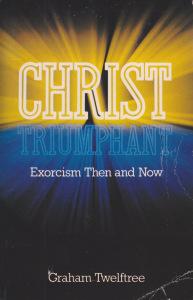 I feel compelled to say that this book was not among the overwritten tomes I mentioned in yesterday’s post.Indeed, although the title reflects the outlook of the author, you need to get to the subtitle to find out what the book’s about.Although I work at an academic press, I disagree with academic book pricing models.Graham Twelftree’s previous book, Jesus the Exorcist, had to be picked up in a paperback reprint edition before it could be affordable to the likes of mere mortals.After reading it I learned that Twelftree had written a more popular book on the topic—Christ Triumphant: Exorcism Then and Now.Putting much of the material from the previous book in less technical terms, this version goes on to ask questions that can’t be put into a standard dissertation, such as “should exorcisms still be done?”
I feel compelled to say that this book was not among the overwritten tomes I mentioned in yesterday’s post.Indeed, although the title reflects the outlook of the author, you need to get to the subtitle to find out what the book’s about.Although I work at an academic press, I disagree with academic book pricing models.Graham Twelftree’s previous book, Jesus the Exorcist, had to be picked up in a paperback reprint edition before it could be affordable to the likes of mere mortals.After reading it I learned that Twelftree had written a more popular book on the topic—Christ Triumphant: Exorcism Then and Now.Putting much of the material from the previous book in less technical terms, this version goes on to ask questions that can’t be put into a standard dissertation, such as “should exorcisms still be done?”
The academic is necessarily a skeptic.One of the biggest problems our society faces is the open credulity of those who haven’t been taught to think critically.Twelftree is a rare academic who keeps an open mind while approaching the material with a healthy skepticism.Often it’s too easy to suggest that disregarding that which doesn’t fit a theory is the only way forward for an academic.Sweeping off the table that which we don’t like.The word Twelftree uses is “residue”—that which remains after the majority of possession cases have been explained medically.The usual response is to disregard this small fraction of anomalous material and claim “case closed.”In this book Twelftree dares to go further.
The supernatural has become an embarrassment for many, even in believing communities.An interventionist god, or demons, would set off chain reactions that would distort the known laws of physics, so such things simply can’t exist.Things which we can’t explain only exist because we haven’t got all the variables yet.I recall how cold that made me feel when I first encountered the idea in physics class.“Scientific determinism” it is sometimes called.This little book rehearses the New Testament material covered in Twelftree’s dissertation, but goes on to raise the implications from that study and apply them to modern times.It’s a brave thing to do in an academic world where brushes and brooms are very common.Where residue is wiped up and tossed away without a second thought.Those who stop to think through the implications are rare, which makes them so much the more interesting reading.And not being from an academic press, such books are oftenaffordable.
